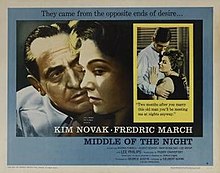Middle of the Night
| Middle of the Night | |
|---|---|
 Film poster | |
| Directed by | Delbert Mann |
| Written by | Paddy Chayefsky |
| Produced by | George Justin |
| Starring | Fredric March Kim Novak |
| Cinematography | Joseph C. Brun |
| Edited by | Carl Lerner |
| Music by | George Bassman |
| Distributed by | Columbia Pictures |
Release date |
|
Running time | 118 minutes |
| Country | United States |
| Language | English |
| Box office | $1.5 million (est. US/ Canada rentals)[1] |
Middle of the Night is a 1959 American drama film directed by Delbert Mann, and released by Columbia Pictures.[2][3] It was entered into the 1959 Cannes Film Festival.[4] It stars Fredric March and Kim Novak. The screenplay was adapted by Paddy Chayefsky from his Broadway play of the same name.
Plot[]
A 24-year-old divorcee, Betty Preisser, a receptionist for a clothing manufacturer, takes some office work home which her boss, widower Jerry Kingsley, a man of 56, drops by to pick up. Professional rather than personal acquaintances, Betty tells Jerry of her loveless marriage to George, a musician. Jerry has a married daughter, Lillian, about her age, and a spinster sister, Evelyn, who is very protective of him.
Jerry works up the nerve to invite Betty to dinner. He meets Betty's mother, Mrs. Mueller, and sister Alice, who share the apartment with Betty. Their relationship grows, but she professes to be reluctant to date her employer. Jerry wonders if their age difference is really behind this reluctance. Despite this, a May–December relationship between them develops.
Female family members of both of them strongly disapprove. Mrs. Mueller calls him a "dirty old man," while Jerry's sister calls Betty a "fortune hunter" and him a fool, although Lillian's husband Jack offers his congratulations, earning scorn from his wife and causing them to quarrel. A colleague, Walter Lockman, trapped in a long and unhappy marriage, urges Jerry to do whatever it takes to find true happiness.
George returns to town and tries to persuade Betty to return to him. In a moment of weakness, they have a romantic tryst. Betty regrets it and explains to Jerry that it meant nothing to her emotionally, but he feels humiliated. His sister observes how depressed Jerry has become when he returns home. At his lowest ebb, he learns that Walter has taken an overdose of pills in a likely suicide attempt. Jerry sees it as a sign to seize the joy in life while he still can. He returns to Betty.
Cast[]
- Fredric March as Jerry Kingsley
- Kim Novak as Betty Preisser
- Glenda Farrell as Mrs. Mueller
- Albert Dekker as Walter Lockman
- Martin Balsam as Jack
- Lee Grant as Marilyn
- Lee Philips as George Preisser
- Edith Meiser as Evelyn Kingsley
- Joan Copeland as Lillian
- Betty Walker as Rosalind Neiman, the widow
- Lou Gilbert as Sherman
- Rudy Bond as Gould
- Effie Afton as Mrs. Herbert, the neighbor
- Jan Norris as Alice Mueller
- David Ford as Paul Kingsley
- Lee Richardson as Joey Lockman
TV play[]
The story originally appeared as an episode of The Philco-Goodyear Television Playhouse.
Production[]
Frank Thompson designed the costumes for the film.[5] Future Oscar winners Martin Balsam (A Thousand Clowns, 1965) and Lee Grant (Shampoo, 1975) also star in this film, which was mildly controversial in its day. It was originally a stage play starring Edward G. Robinson. Some of the stage cast were in the film.
Awards[]
- Palme d'Or, Cannes Film Festival - nominated
- Best Actor Golden Globe (Fredric March) - nominated
- Top Ten Films of the Year, National Board of Review
References[]
- ^ "1959: Probable Domestic Take", Variety, January 6, 1960 p 34
- ^ Variety film review; May 20, 1959, page 6.
- ^ Harrison's Reports film review; May 23, 1959, page 82.
- ^ "Festival de Cannes: Middle of the Night". festival-cannes.com. Retrieved February 14, 2009.
- ^ Peter Kihiss (June 7, 1977). "Frank Thompson, Top Designer Of Costumes for Stage and Ballet". The New York Times.
External links[]
- 1959 films
- English-language films
- 1959 romantic drama films
- 1950s English-language films
- American films
- American black-and-white films
- American romantic drama films
- American films based on plays
- Columbia Pictures films
- Films based on television plays
- Films directed by Delbert Mann
- Films set in New York City
- Films shot in New York City
- Films with screenplays by Paddy Chayefsky
